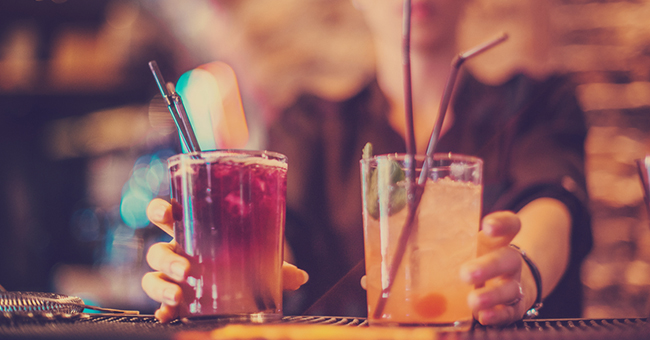Last month, some bartenders and drinkers participated in Sober October, not consuming alcohol for a month ahead of the holiday season. In England — where Dry January was well established as a time to detox — it’s a campaign that challenges people to give up booze and raise money to fight cancer. The hospitality industry is notorious for alcohol abuse, so it may come as a surprise that plenty of bartenders are actually sober.
It might seem counterintuitive to continue working in a bar after getting sober. In some circles, particularly those working a program of recovery, it may even be frowned upon.
But maybe it’s not necessary to give up alcohol as well as a flexible schedule, lucrative pay and camaraderie. Steve West is co-owner of 68 Jay St Bar, a neighborhood spot in the DUMBO neighborhood of Brooklyn, and he has been sober for three years. “Alcohol is everywhere,” West says. “It’s all around you. Being conscious and aware that I can no longer drink alcohol is my responsibility.”
Nicole Richards, who tends bar at The Forge in Oakland’s Jack London Square, has been sober for nine years. “It’s an industry that I know. As a working class person in this industry, this is just what you do … I’m sober because I’m an alcoholic, that’s very clear,” she says. “There’s not enough alcohol in this place for me.”
Lifting up the stories of sober bartenders can be a boon for the industry and for folks struggling with problem drinking, looking to moderate their consumption, or taking a break, whether temporary or permanent. Here are some of the insights shared.
1. Check your assumptions
Many people believe that shift drinks and taking shots with customers are a necessary part of the job. Bartenders who try to limit their consumption employ strategies to misdirect or limit their participation in drinking culture. Changing location or counting drinks might help, but Ninoska “Nina” Granados, who works at Vanguard Wine Bar in Manhattan and cut her alcohol consumption drastically, was surprised to find that simply saying “no thanks” also works.
“For me it was, don’t drink what you don’t like, like a Jäger shot. It took a lot time to get there, to stand my ground. I always thought that would get this negative reaction. Most of the time, it’s ‘eh, alright.’ That was the first step for me, to realize that you don’t miss it and get more in tune with your body physically.”
2. Find community at work
Since drinking is so ingrained with staff, it can be hard to not participate or to walk away when someone is overdoing it. Richards jokes that it makes her more of a motherly figure with her younger co-workers, but says she made peace with it, “Is it okay to feel like I’m not part of the group? I find other ways to connect.”
Being surrounded by people who care about you but don’t enable you might even be a benefit for those looking stop drinking. West says “the staff and [co-owner] Karen were one of my biggest support groups” after a stint in rehab, intensive outpatient care, and group and individual counseling.
At first, Richards says, bringing up her sobriety invited “countless conversations with customers who wanted to have conversations about their relationship with alcohol.” Now she’s more “protective” of her personal life.
Granados works at a wine bar that’s a “hot spot for first dates” and she regularly observes customers who are clearly not drinking alcohol, but need a safe place to meet. “We’re a place where that’s okay,” she says, adding that they serve naturally made sodas as an alternative.
In Oregon, the Oregon Liquor Control Commission service permit requires that all bars also serve food. These measures might help create an environment where socializing is not focused solely on consuming alcohol.
3. Actively work at being present
Granados credits a long time practice of daily meditation, which led to a “transformational moment” and a realization to “hone in on the things that I needed to do and value the most.” Meditation and yoga help her to stay clear minded and be fully present.
Richards, who relied very heavily on Alcoholics Anonymous in the beginning, also found meditation, and says that “recovery has to blossom out to include these other things.” After quieting her mind with substances for so long, meditation was “something that has helped my recovery and human condition, made me more comfortable in the world.”
Dharma Punx and the Insight Timer app are great resources for people interested in developing a meditation practice.
4. Recognize negative habits and break free of them
Becoming a certified yoga instructor helped Granados to find balance and thrive at work. She actively practices and creates ritual around a healthier lifestyle, including finding something physical to counteract stress, incorporating people and activities that don’t involve drinking into her life, and, when she does choose to drink, being mindful about the company she keeps.
“I have friends that I don’t drink with, and friends that I do drink with, and I keep those two separate.”
For many, drinking simply becomes a habit, sometimes an unmanageable one. Richards says, “I had to break free of my habitual relationship with these things, what caused me suffering.”
5. Support your transition with hobbies and self-care
Finding an activity that supports or anchors a transition to sobriety or a healthier relationship with alcohol is critical. This can be meditation or exercise or practicing self-care in other ways. For West, it’s returning to the art studio and exhibiting work: “I could not have made the body of artwork that I’ve produced without being sober.”
Bartenders who don’t drink embrace the professionalism and clarity that they have as assets when handling money and dealing with difficult situations. Whether you drink or not, having a healthy relationship with alcohol is critical, especially when surrounded by it at work.
If you or someone you know is struggling with alcoholism or depression, see here, here and here for lists of organizations offering resources for advocacy, coping, support and inpatient treatment options.





